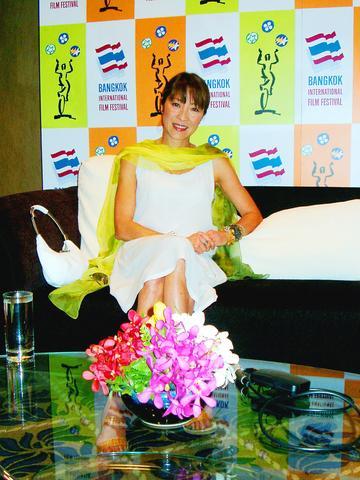Wearing a white, linen Armani dress and Fendi sandals, Michelle Yeoh looked poised and elegant arriving at the Bangkok International Film Festival in the second week.
She said she had been relaxing in Thailand, eating lots of tom-yam gun and mango salad and indulging in facials and a body spa.

PHOTO: YU SEN-LUN, TAIPEI TIMES
She said she had gone shopping wearing a big hat and sunglasses to avoid being noticed, but was still recognized by the store clerks and thereby eventually got a fat discount for the dresses and accessories she bought.
Of course Yeoh was not invited here for a holiday and came, primarily, to promote her latest filmSilver Hawk (飛鷹), an action drama released earlier in Hong Kong for the Lunar New Year holiday. Co-starring Taiwanese actor Richie Jen (任賢齊), Yeoh -- as in her last film The Touch (天脈傳奇), plays an extraordinary woman from a martial arts family. She and Jen go through a series of adventures in Shanghai and Beijing. Again, Yeoh does a lot of flying and kicking in the film.
Having acted in so many action films and always as a heroine, the question is, does Yeoh get tired of her screen image and want to take on different roles.
"Of course I want to try different roles," Yeoh said. "But I also wanted to challenge my physical strength while I can still kick around."
This is the reason why, in Silver Hawk, Yeoh dared to ride a motorcycle over the Great Wall.
"You see lots of super heroes in Hollywood movies doing amazing stunts. So I guess it's about time for a woman to do such exciting things," Yeoh said, adding she did have plans to act in a musical.
Fans of Yeoh may know she studied ballet in her youth.
"After years of training, the grace and the elegance of ballet stay with you," Michelle Yeoh said, adding she hoped to work with John Woo (吳宇森) on a musical.
"I knew that he wanted to work on a musical project for a long time," she said.
Her next project, however, will be the US$30 million budget Hua Mulan (花木蘭), the well-known story about a young woman in the Han dynasty who disguises herself as a man to join the army, as an act of filial duty. The story will be written by Wang Hui-ling (王蕙玲), scriptwriter of Crouching Tiger, Hidden Dragon (臥虎藏龍).
As Yeoh describes it, this will be another strong-woman role. "I do believe that women generally are strong. But this does not mean that she has to be butch or tough on the outside. She can look feminine and soft but actually be strong on the inside, like the character of Yu Hsiu-lien in Crouching Tiger," Yeoh said. "But in the case of Hua Mu-lan, maybe she will have to look butch on the outside."

On April 26, The Lancet published a letter from two doctors at Taichung-based China Medical University Hospital (CMUH) warning that “Taiwan’s Health Care System is on the Brink of Collapse.” The authors said that “Years of policy inaction and mismanagement of resources have led to the National Health Insurance system operating under unsustainable conditions.” The pushback was immediate. Errors in the paper were quickly identified and publicized, to discredit the authors (the hospital apologized). CNA reported that CMUH said the letter described Taiwan in 2021 as having 62 nurses per 10,000 people, when the correct number was 78 nurses per 10,000

As we live longer, our risk of cognitive impairment is increasing. How can we delay the onset of symptoms? Do we have to give up every indulgence or can small changes make a difference? We asked neurologists for tips on how to keep our brains healthy for life. TAKE CARE OF YOUR HEALTH “All of the sensible things that apply to bodily health apply to brain health,” says Suzanne O’Sullivan, a consultant in neurology at the National Hospital for Neurology and Neurosurgery in London, and the author of The Age of Diagnosis. “When you’re 20, you can get away with absolute

May 5 to May 11 What started out as friction between Taiwanese students at Taichung First High School and a Japanese head cook escalated dramatically over the first two weeks of May 1927. It began on April 30 when the cook’s wife knew that lotus starch used in that night’s dinner had rat feces in it, but failed to inform staff until the meal was already prepared. The students believed that her silence was intentional, and filed a complaint. The school’s Japanese administrators sided with the cook’s family, dismissing the students as troublemakers and clamping down on their freedoms — with

As Donald Trump’s executive order in March led to the shuttering of Voice of America (VOA) — the global broadcaster whose roots date back to the fight against Nazi propaganda — he quickly attracted support from figures not used to aligning themselves with any US administration. Trump had ordered the US Agency for Global Media, the federal agency that funds VOA and other groups promoting independent journalism overseas, to be “eliminated to the maximum extent consistent with applicable law.” The decision suddenly halted programming in 49 languages to more than 425 million people. In Moscow, Margarita Simonyan, the hardline editor-in-chief of the